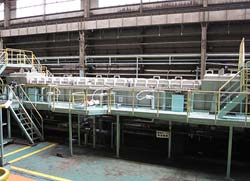Siemens installs first polypropylene tanks for stainless steel pickling line in Japan

A polypropylene process tank from Siemens
“We’re proud that an industry leader like NSSC has selected Siemens in bringing this innovative polypropylene tank technology to Japan,” said Jagannath Rao, president of the Industry Solutions Division, Siemens Industry, Inc. “Japan is a new market for our polypropylene tank business, and we look forward to helping NSSC increase cost-savings and add environmental value to their steel mills with our custom-designed polypropylene tanks.”
Siemens designed and installed polypropylene pickling tanks for the No. 1 annealing and pickling line (APL) at NSSC’s Hikari Works in Yamaguchi Prefecture, Japan. The order includes two polypropylene pickling tanks with covers, a grinding brush scrubber chamber and spares. A second polypropylene pickling tank for the No. 2 APL will be added at the same location in December 2011.
“By providing equipment made from plastics, like polypropylene, Siemens is able to offer designs that are not easily accomplished with traditional materials,” said Tom Fitzpatrick, product manager for Metals Technologies, Siemens Industry, Inc. “The customer sees benefits in the form of lower initial cost, much lower maintenance costs, and reduced labor costs. The total cost of ownership is significantly less with polypropylene tanks than with traditional brick and rubber lined steel tanks.”
There are additional environmental advantages to choosing polypropylene tanks over steel tanks. By removing the rubber lining found in steel tanks, the corrosion-resistant polypropylene tanks reduce the risk for acid leakage and fumes, allowing for better control over the acid environment and extended lifecycles.
The Siemens Industry Sector (Erlangen, Germany) is the worldwide leading supplier of environmentally friendly production, transportation and building technologies. With integrated automation technologies and comprehensive
industry-specific solutions, Siemens increases the productivity, efficiency and flexibility of its customers in the fields of industry and infrastructure. In fiscal 2010, which ended on September 30, 2010, revenue from continuing operations of the Industry Sector (excluding Osram) totaled around €30.2 billion. At the end of September 2010, Siemens Industry Sector had around 164,000 employees worldwide without consideration of Osram.
Further information is available on the Internet at: www.siemens.com/industry.
The Siemens Industry Solutions Division (Erlangen, Germany) is one of the world's leading solution and service providers for industrial and infrastructure facilities comprising the business activities of Siemens VAI Metals Technologies, Water Technologies and Industrial Technologies. Activities include engineering and installation, operation and service for the entire life cycle. A wide-ranging portfolio of environmental solutions helps industrial companies to use energy, water and equipment efficiently, reduce emissions and comply with environmental guidelines. With around 29,000 employees worldwide (September 30), Siemens Industry Solutions posted sales of €6.0 billion in fiscal year 2010. www.siemens.com/industry-solutions
Siemens AG
Corporate Communications and Government Affairs
Wittelsbacherplatz 2, 80333 Munich
Germany
Reference number: IIS201109.196e fp
Media Relations: Dr. Rainer Schulze
Telephone: +49 9131 7-44544
E-mail: rainer.schulze@siemens.com
Media Contact
More Information:
http://www.siemens.com/metalsAll latest news from the category: Corporate News
Newest articles

Silicon Carbide Innovation Alliance to drive industrial-scale semiconductor work
Known for its ability to withstand extreme environments and high voltages, silicon carbide (SiC) is a semiconducting material made up of silicon and carbon atoms arranged into crystals that is…

New SPECT/CT technique shows impressive biomarker identification
…offers increased access for prostate cancer patients. A novel SPECT/CT acquisition method can accurately detect radiopharmaceutical biodistribution in a convenient manner for prostate cancer patients, opening the door for more…

How 3D printers can give robots a soft touch
Soft skin coverings and touch sensors have emerged as a promising feature for robots that are both safer and more intuitive for human interaction, but they are expensive and difficult…





















